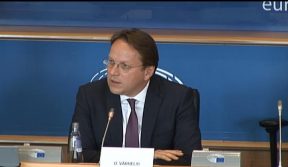In a first, EU to investigate if funding went to terror linked NGOs
During a May 19, 2020 meeting of the European Parliament Committee on Foreign Affairs (AFET), Commissioner for Neighborhood and Enlargement Olivér Várhelyi stated that he had instructed the heads of EU delegations to Israel and West Bank/ Gaza to “look deep” in to the allegations that some EU funds go to terror-linked or -supporting NGOs, declaring that such funding “will not be tolerated.”1

Olivér Várhelyi, Commissioner for Neighbourhood and Enlargement, addresses issue of EU funding to Palestinian NGOs that could be linked to terror groups
This follows concerns raised by Members of the European Parliament and civil society over a “clarification letter regarding the EU-funded contracts” sent on March 30, 2020 by the EU Representative Office to the West Bank and Gaza to Palestinian NGO Network (PNGO) – an umbrella organization of 135 Palestinian NGOs. In it, the EU diplomats appear to give in to Palestinian pressure and effectively annul EU regulations that prohibit the transfer of EU funds to terror groups or individuals connected to these groups (what Palestinian NGOs label “political parties” and “resistance factions”). After the letter was made public in Israeli media, the EU Ambassador to Israel was summoned for a demarche at the Israeli Ministry of Foreign Affairs.
At least five members of PNGO have reported ties to EU-designated terror organizations, including through employees and/or board members who are directly involved in the activities and programs – on top of the various Palestinian NGOs and humanitarian groups that are affiliated with the PFLP. In addition to ongoing funding, on April 9 the EU announced a massive assistance package to the PA of “around €71 million in response to the coronavirus pandemic,” including “€6.9 million in humanitarian aid” to unnamed “non-governmental organisations and UN agencies already present on the ground in the West Bank and Gaza Strip.”
In practice, this means that even if a Palestinian NGO applying for EU grants is an affiliate of terrorist groups or employs individuals from these groups, the EU will still provide them with taxpayer funding – whether designated for emergency responses to COVID-19 or for regular programs.
Background
In 2019, the EU introduced a requirement in its contracts with NGOs, under “General conditions applicable to European Union-financed grant contracts for external actions” (Annex G.2, Annex II, Article 1.5 bis). It stipulates that “Grant beneficiaries and contractors must ensure that there is no detection of subcontractors, natural persons, including participants to workshops and/or trainings and recipients of financial support to third parties, in the lists of EU restrictive measures.” In the Palestinian context, these lists EU-designated terrorist organizations (e.g. Hamas, Izzedine al-Qassam Brigades, Al-Aqsa Martyrs Brigade, Islamic Jihad, and the Popular Front for the Liberation of Palestine).
According to media reports, during a December 2019 meeting with EU officials, representatives from PNGO “refused to sign an EU grant request which stipulates among its criteria that beneficiaries must refuse to transfer any EU aid given to terrorist groups or entities….The organizations in question steadfastly decline to do so, claiming Palestinian terrorist groups are merely ‘political parties.’” According to the European Legal Support Center (ELSC),2 a Netherlands-based initiative of PNGO and Rights Forum, then Acting EU Representative in Ramallah Tomas Niklasson told PNGO, “Given that there is no individual Palestinian included in the EU (anti-terror) list; the obligation not to transfer funds to any of the seven Palestinian organisations currently on the list does not create any additional obligation for civil society organisations (beyond their obligations under domestic legislation) and that there is no obligation or expectation from the EU’s side that we would discriminate against a person based on political affiliation.”
Far from being reassured by Niklasson, on December 30, 2019, multiple Palestinian NGOs, including PNGO members, launched a “Palestinian National Campaign to Reject Conditional Funding.” The campaign, which rejects the EC’s “conditioned funding” and “so-called anti-terrorism clauses and policies…on preventing terrorism that affect the history and struggle of our people” (emphasis added), justifies the use of violence and claims that the “Palestinian resistance factions are not terrorist organizations,” (see video clip).
In addition, it appears that on January 20, 2020, during a meeting between officials from Palestinian NGOs and EU representatives in Brussels, EU’s appeasement message was reiterated. According to ELSC, Palestine Desk Officer of the European External Action Service Paloma Portela and Francesca Pessina from the European Commission’s Department for International Cooperation and Development (DEVCO) told the NGO executives that “the [anti-terror] clause did not impose new nor different obligations on EU beneficiaries in Palestine.”
In parallel to the intimidation and lobbying campaign by Palestinian NGOs and the PA,3 ELSC published a memo (March 3,2020) analyzing the anti-terror clause and assessing, like the EU representatives, that “the inclusion of this clause will not have any tangible effect on Palestinian Civil Society Organizations” (emphasis in original).
In addition to the memo, the Palestinian NGO BADIL, which initiated the “Palestinian National Campaign to Reject Conditional Funding” and claims to be a PNGO member, published (May 7, 2020) a “Position Paper: European Union Conditional Funding: Its Illegality and Political Implications.”
- According to the paper, “the Article 1.5 bis is not only inconsistent with the principles of humanitarian action, but also with the Palestinian people’s legitimate human rights as recognized under international law, including the right to self-determination, and the right to resist by any legitimate means against foreign oppression, occupation, colonization and apartheid. The current counter-terrorism framework imposed on Palestinian civil society by means of Article 1.5 bis criminalizes the Palestinian people’s struggle for their right to self-determination, contributes to the de-politicization and alienation of Palestinian civil society, and neglects the Palestinian people’s right to legitimate resistance.”
The EU’s March 30 Letter
The March 30 communication stresses that “it is understood that a natural person affiliated to, sympathizing with, or supporting any of the groups or entities mentioned in the EU restrictive lists is not excluded from benefitting from EU-funded activities, unless his/her exact name and surname (confirming his/her identity) corresponds to any of the natural persons on the EU restrictive lists” (emphasis added). Moreover, the letter notes, “As far as Palestine is concerned, there are no Palestinian natural persons on the restrictive measures list, pursuant to Council Regulation 2580/2001.”
In other words, even if the Palestinian NGOs applying for EU grants is an affiliate of EU-designated terrorist groups (as a number are) or employs individuals from these groups, the EU will still provide them with taxpayer funding.
The EU also emphasizes that “the EU does not ask any civil society organization to change its political position towards any Palestinian faction or to discriminate against any natural person based on his/her political affiliation.”
Background on PNGO
PNGO enjoys generous funding from the European Union (EU)4 and other international donors for the stated purpose of strengthening, coordinating, and networking among Palestinian civil society. PNGO also enjoys permanent representation in the UN’s Humanitarian Country Team, which coordinates all international aid in Gaza and the West Bank. This comes with a seat on the advisory board of the UN’s humanitarian pooled fund, which is designated for emergencies, granting PNGO decision-making power in selecting the fund’s beneficiaries.
PNGO ties to the PFLP terror group
Walid Hanatsheh (Abu Ras) is listed as a PNGO board member on behalf of a PFLP-linked NGO, Health Work Committees (HWC), and is the HWC finance and administration manager.
- Hanatsheh was arrested in October 2019, alleged to be the leader of PFLP “military” operations in the West Bank.
- According to a December 12, 2019 indictment in Israeli military court, he commanded Samer Arbid, who has been charged for leading the PFLP terror cell that carried out an August 2019 bombing attack that murdered 17-year-old Rina Shnerb, and injured her father and brother (on file with NGO Monitor).
- According to an Israeli media report, Hanatsheh bankrolled the bombing.
PNGO describes Ashraf Abu Aram as “a human rights defender and advocacy officer of Palestinian NGO Network (PNGO).” According to a November 2019 statement by PNGO, Abu Aram was arrested by the Israeli security forces (November 7, 2019) and “was transferred under ‘administrative detention for four months.’”
A 2012 report in Haaretz identified Abu Aram as a PFLP member who was arrested for “allegedly planning to kidnap an IDF soldier in order to bring about the release of PFLP leader Ahmed Sa’adat from an Israeli jail.” According to the Israel Security Agency (Shabak), “Abu Aram already contacted a local weapons dealer in an effort to obtain two pistols and an automatic rifle with which to carry out the planned abduction.”
Several PNGO member organizations have ties to the PFLP terror group:
- Union of Agricultural Work Committees (UAWC), which has a seat on PNGO’s board5
- HWC, which also has a board seat6
- Addameer, “executive member”7 of PNGO, according to Addameer’s website
- Al-Dameer8
- Union of Palestinian Women’s Committees (UPWC)9
Samer Arbid and Abdel Razeq Farraj, both senior UAWC employees, were arrested in 2019 for their alleged involvement in the August 23, 2019 bombing attack (see above).
- Samer Arbid: According to Israeli security officials, Samer Arbid commanded a PFLP terror cell that carried out the bombing against Israeli civilians. According to the Israel Security Agency (Shabak), Arbid prepared and detonated the explosive device.
- According to Arabic-language media, Arbid worked as the accountant of the UAWC at the time of his September 2019 arrest.
- Abdel Razeq Farraj: According to his indictment, he authorized the bombing.
- According to Farraj’s LinkedIn profile, Farraj is the “Administrative Manager at Union of Agricultural work Committees.” An August 2018 Amnesty International document refers to him as the “Finance and Administration Director” at UAWC
PNGO’s Rejection of Anti-Terrorism Funding Requirements
PNGO has previously rejected anti-terrorism funding language, defended Palestinian “resistance,” and blocked normalization with Israel and Israelis:
- In June 2017, PNGO condemned Norway for pulling funding from a youth center named after Dalal Mughrabi – a terrorist who in 1978 murdered 37 civilians, including 12 children – asserting that “there is a difference between freedom fighters and terrorists.” PNGO later scrubbed the statement from its website (preserved on “Internet Archive”: “PNGO Condemns Norway demanding PA return funds for Center Named after Dalal Mughrabi”).
- In April 2017, PNGO called on the international community not to “use aid to undermine legitimate Palestinian resistance.” According to PNGO, “We reject all de-legitimization or criminalization of lawful Palestinian resistance, whether in form of allegations of terrorism, anti-semitism or otherwise… We call on all governments and aid providers to respect our right to lawful resistance, support Palestinian human rights defenders, and ensure equal, impartial and transparent access to funding for all.”
- According to a 2013 study commissioned by the UN, PNGO “stated that its members would not sign funding agreements that included the ATC [Anti-Terror Certificate]. This is now a condition for membership under PNGO byelaws [sic].”
- In 2013, PNGO condemned the EU Partnership for Peace program for encouraging “normalization between Palestinian and Israeli civil society organizations.”
- In 2008, PNGO was one of the authors of “The Palestinian NGOs Code of Conduct,” which obliges members to “be in line with the national agenda without any normalization activities with the occupier, neither at the political-security nor the cultural or developmental levels.” In other words, if an NGO wishes to promote cultural exchange between Israelis and Palestinians—a form of normalization—it will not be represented by PNGO, putting their funding at risk.
- In 2007, PNGO spearheaded a boycott of USAID funding following the introduction of anti-terrorism clauses in grant agreements.
Footnotes
- Olivér Várhelyi, EU Commissioner for Neighbourhood and Enlargement, during an AFET meeting: “On how to ensure that our financial support does not get to terrorists, or terrorist , or organizations that are supporting terrorists, or organizations who are supporting terrorist organizations, we have received a number of requests from the Israeli authorities in that regard also from the public in Israel. I took immediate action, I asked both the heads of delegations in Tel Aviv but also in the West Bank and Gaza Strip to look into the matter. They will have to look deep, and if there is any concern, any concern, we will act immediately. There is no terrorist financing from EU funds, as long as there are EU funds, this can not happen, this will not be tolerated, and if it happens, it will be rectified. And I will see it to it myself that it is done and delivered.” (18.35’.50”-18.37’.18”)
- ELSC describes is mission as “to provide legal assistance to organizations, groups and individuals who are facing repression in Europe because they speak out or take peaceful action for freedom and justice for the Palestinian people, and to give strategic legal support to campaigns of the Palestine solidarity movement”
- On January 3, 2020, Saeb Erekat, the Secretary General of the PLO and Head of the Negotiations Affairs Dept., condemned the introduction of EU’s anti-terror funding requirement and called on the EU to withdraw from the new financing conditions.
- PNGO is a partner of a current €261,914 European Union grant titled “torture is a humiliation of dignity;” In 2016-2019, PNGO was a co-grantee of a €446,482 EU grant titled “Contributing to the respect, protection and promotion of the right to association in the Gaza Strip.”
- PNGO, “Board members,”: http://www.pngo.net/board-members/
- PNGO, “Board members,”: http://www.pngo.net/board-members/
- Addameer, “Our Work”: http://www.addameer.org/about/our-work
- Al-Dameer, “Evacuation of Responsibility”: https://www.aldameer.org/en/Evacuation%20of%20Responsibility.html
- UPWC, “عن الإتحاد” :https://upwc.ps/?page_id=408


